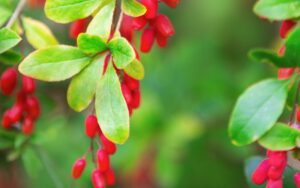Berberine – definition
Berberine is an isoquinoline alkaloid belonging to plants of the barberry family. The berberine content of the leaves and root of barberry (B. vulgaris) is 1.5-2%. In the digestive tract, it is converted by the intestinal microbiota to the dihydroberberine form, which is much better absorbed. After oral administration, it is distributed in the liver, muscles, kidneys, lungs, brain, heart, pancreas and adipose tissue. Berberine has a number of different properties including: antidiabetic, hypolipidemic, anti-inflammatory, antihypertensive, antidiarrheal, hepatoprotective, anticancer, antidepressant, antiviral and antibacterial.

Berberine – functions
Berberine acts through various mechanisms and its effects on the body are multidirectional. It is one of the most promising plant-based medicines for the treatment of cardiovascular and metabolic diseases. It can act therapeutically in a number of diseases, such as diabetes, obesity, arteriosclerosis, cardiovascular disease, inflammatory bowel disease (IBD), polycystic ovarian syndrome, liver disease, cancer, Alzheimer’s disease and rheumatoid arthritis. Many studies have confirmed the antidiabetic effects of berberine through properties such as promoting insulin secretion, reducing insulin resistance, inhibiting gluconeogenesis (glucose production), promoting glucose uptake and glycolysis (glucose metabolism), reducing inflammation, inhibiting several enzymes and modulating intestinal microflora disorders. Going into biochemical detail, berberine, among other things, attenuates insulin resistance by increasing AMPK activity and the expression of type 4 glucose transporters (GLUT4) and, as an inhibitor of the intestinal enzyme (alpha-glucosidase), delays carbohydrate absorption and inhibits postprandial hyperglycaemia. In patients with type 2 diabetes (and beyond), berberine reduces such inflammatory markers as: CRP, IL-6, IL-1β and TNF-α concentrations. In addition, it is similarly effective in lowering fasting glucose and glycated haemoglobin levels to metformin, a drug used for type 2 diabetes and insulin resistance. This plant-based alkaloid promotes weight loss by inhibiting adipogenesis (i.e. the formation of adipose tissue), reducing inflammation in adipose tissue, promoting thermogenesis and energy expenditure, alleviating adipose tissue fibrosis and modulating gut microflora dysbiosis. It can also counteract the development of hepatic steatosis (NAFLD) and fibrosis by regulating lipid metabolism, alleviating hepatic oxidative stress and inhibiting lipogenesis. Berberine is also proving useful in hyperlipidaemia, as it reduces serum triglycerides, total cholesterol and LDL-C cholesterol and increases serum HDL-C cholesterol. The plant can significantly reduce serum uric acid levels, which is indicated in the treatment of hyperuricaemia or gout. Berberine regulates microbial diversity in the gut, which strengthens intestinal integrity, including increasing the ratio of Bacteroidetes: Firmicutes (whose imbalance is linked to several diseases, including obesity), the population of Bacteroidetes, Clostridia, Lactobacillales, Prevotellaceae, Ruminococcus, Lactobacillus, Akkermansia and the percentage of bacteria producing short-chain fatty acids – SCFAs (butyrate alleviates obesity and insulin resistance), among others.
Berberine counteracts cancer progression and has been studied to prevent cancer cell proliferation by controlling the cell cycle, triggering apoptosis, autophagy and inhibiting metastasis. So far, positive effects have been observed in cancers of the colon, breast, liver, pancreas, mouth, bowel, bone, skin, prostate and thyroid. In addition to the already cited positive properties of this plant, it should be added that berberine has an antiviral effect, i.e. it reduces the replication of the virus of herpes simplex virus (HSV), human papillomavirus (HPV), cytomegalovirus (HCMV) and human immunodeficiency virus (HIV), among others, and strikes specific interactions between the virus and its host. In addition, it supports the body’s immune response, which allows the virus to be removed more effectively.

Berberine – dosage and contraindications
In the studies, berberine was most often supplemented at a dose of 500 mg to 1.5-2g (e.g. 500 mg 3 times a day). Berberine interacts with certain drugs: metformin, ketoconazole, digoxin and cyclosporine A, so special care should be taken when using these preparations. In addition, pregnant and breastfeeding women and young children should avoid its use. Taking berberine can cause gastrointestinal reactions such as diarrhoea, abdominal bloating or constipation.
Bibliography:
Mróz, Michalina, Pastusiak, Katarzyna and Bogdański, Paweł. “Potencjalne możliwości wykorzystania berberyny w przeciwdziałaniu insulinooporności i w cukrzycy typu 2” Postępy Higieny i Medycyny Doświadczalnej, vol.75, no.1, 2021, pp.790-801.
Xu X, Yi H, Wu J, Kuang T, Zhang J, Li Q, Du H, Xu T, Jiang G, Fan G. Therapeutic effect of berberine on metabolic diseases: Both pharmacological data and clinical evidence. Biomed Pharmacother. 2021 Jan;133:110984.
Guo J, Chen H, Zhang X, Lou W, Zhang P, Qiu Y, Zhang C, Wang Y, Liu WJ. The Effect of Berberine on Metabolic Profiles in Type 2 Diabetic Patients: A Systematic Review and Meta-Analysis of Randomized Controlled Trials. Oxid Med Cell Longev. 2021 Dec 15;2021:2074610.
Zhang L, Wu X, Yang R, Chen F, Liao Y, Zhu Z, Wu Z, Sun X, Wang L. Effects of Berberine on the Gastrointestinal Microbiota. Front Cell Infect Microbiol. 2021 Feb 19;10:588517.
Rauf A, Abu-Izneid T, Khalil AA, Imran M, Shah ZA, Emran TB, Mitra S, Khan Z, Alhumaydhi FA, Aljohani ASM, Khan I, Rahman MM, Jeandet P, Gondal TA. Berberine as a Potential Anticancer Agent: A Comprehensive Review. Molecules. 2021 Dec 4;26(23):7368.
Warowicka A, Nawrot R, Goździcka-Józefiak A. Antiviral activity of berberine. Arch Virol. 2020 Sep;165(9):1935-1945.


